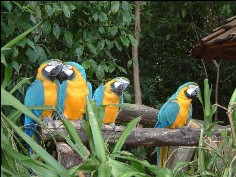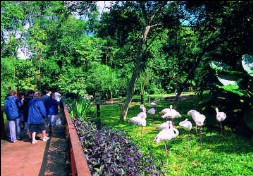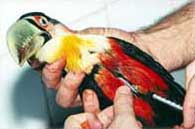Bird Park Iguazu
This is a world-class standard Bird Park situated in 4 hectares of second-growth subtropical forest. There are over 500 birds, both indigenous and from other continents and visitors can be in contact with them without restriction of netting and cages. An important breeding program is in progress for some of the endangered species. The place is kept by professionals in biology, veterinary, agronomy. Located at the Cataratas Highway, across from the Iguassu National Park Visitors’ Center, two kilometers from the Foz do Iguaçu International Airport and 14kilometers from downtown Foz do Iguaçu. The Bird Park has 17 hectares of second-growth vegetation, of which only 4 hectares are destined for the installations with the rest having been singled out for preservation. A private enterprise, this Park was created in 1994 and is run by professionals in the fields of biology, veterinary agronomy plus well trained keepers and maintenance staff responsible for the welfare of animals and of the gardens.
The Park keeps over 900 birds from 150 species, the majority being Brazilian birds. One third of these species is considered threatened. All the birds in the Park have come from zoos or IBAMA-authorized breeders. The Bird Park will not, under any term, take in animals from unknown sources or originated in animal trafficking. All animals are registered with a report being sent yearly to the Brazilian Zoo Society and the official Ibama. Some of these birds have been rehabilitated and cannot return to nature.
Reproduction The reproduction of animals in captivity is important to assure biological diversity, guaranteeing ex-situ genetically feasible populations. Captive animals also supply valuable information and better knowledge of the fauna. Despite the short time since its foundation, the Bird has had success in the reproduction of some species, among which we single out several species of arasari, trumpet birds, crested jays, parakeets, bue and yellow macaw, crowned-grou, vulturina and others. The purple-faced parrot (Amazona brasiliensis) is expected to reproduce and to supply information for the preservation of this threatened species.
Community Service
The Bird Park keeps an entirely free community visit program geared at the environmental awareness open to schools throughout the region including visits to blind children.
The visit
The visit is carried out through well identified catwalks through native vegetation. They lead visitors to several enormous life-size aviaries each with 630m² with a height of 8 meters, enriched with cascades, bridges, vegetation, where the visitor enters and appreciates the behavior of different species without the interference of netting or screens. In smaller aviaries specimens from Southwestern Asia, Oceania and Africa are exhibited. A delicate and colorful aviary shelters regional butterflies and hummingbirds. In another natural environment visitors will find caymans and boas in the space reserved for reptiles. Duration of tour: 1 hour. Daily from 8h30 a.m. to 06h p.m.
Accessibility to visitors in wheelchairs




